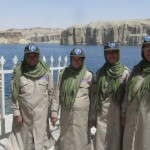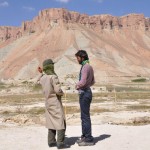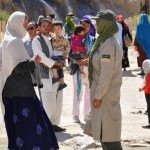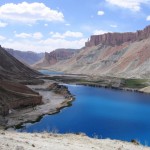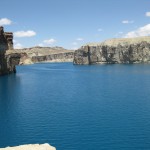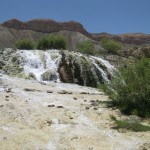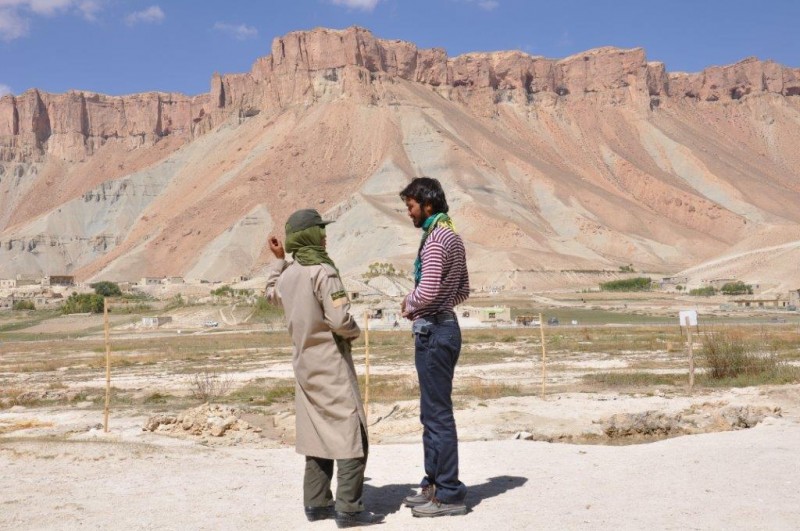
One of Band-e-Amir’s female park rangers assists a visitor at the park. Photo by Naseem Sultani/Wildlife Conservation Society.
A statistic gathered by the World Bank tells us that only 16 percent of women in Afghanistan are employed in the formal economy. Part of that small percentage consists of four female park rangers who were recently hired at Afghanistan’s Band-e-Amir National Park—the first time in history that women have been employed in the position.
The women—Sediqa, Nikbakht, Fatima, and Kubra—were hired in July.
“The new park rangers powerfully demonstrate that Afghan women can successfully step into professional positions where they are actively engaged in protecting Afghanistan’s wildlife and wild places,” Anne G. Williams, Wildlife Conservation Society Afghanistan Livelihoods and Gender Advisor, said in a news release.
Richard Paley, director of the WCS Afghanistan Program, said discussion of hiring female park rangers at Afghanistan’s only national park was first discussed at a park advisory committee meeting back in 2012. There was unanimous agreement that they should in fact be hired. Endorsement of the idea was given by park rangers, representatives from the 14 villages within the park, as well as provincial and district governments. It was the Ministry of Agriculture, Irrigation, and Livestock that began recruiting for the positions.
My questions were passed along by the WCS to female staff members at the park who sat down with the four new rangers, worked as translators, and responded with answers the women developed together.
“At first, because of the ‘unknown’ we didn’t really know what this job would mean for us, our families, or our communities. No one really knew what to expect, but following the training that we were given by WCS, where it was clearly explained to us what a ranger is, and what duties we were going to carry out; and the reason why we were being employed was also explained, then we understood more and were happy.”
Paley said there was never any negativity surrounding the discussion that he noticed.
“In the community it’s been very positive, which is not surprising since the community was instrumental in deciding to recruit them in the first place,” Paley shared. “Elsewhere; we have yet to see since the news is gradually spreading beyond Band-e-Amir.”
As for how the four women felt before beginning work, they agreed they were all somewhat reluctant.
“Initially we were very hesitant, because of the unknown, as this was a totally unfamiliar to us. Even our husbands were suspicious and hesitant, but when the reason for recruitment was explained to us, we had a better understanding and were assured, and now that we have been working for two months, we now understand.”
This landmark decision is a huge step forward for women in the troubled nation. Less than one percent of the Afghanistan National Police force is female, according to NATO.
“Our new park rangers represent the growing employment opportunities for all [of] Afghanistan’s citizens as well as the preservation of the country’s natural heritage,” Dr. Habiba Sarabi, Governor of Bamyan Province and Afghanistan’s first female governor, said in a news release.
Upon beginning their new job, the female park rangers received the same preparation as their male colleagues, with equipment and training provided by the USAID-funded Improving Livelihoods and Governance through Natural Resource Management Project, which was implemented by the WCS.
“WCS has been working with the communities and the schools in the villages doing environment education, and have annually held an environmental education ‘parents day,’ so the whole community is familiar with park rangers, and I am sure that this familiarity has made it easier for these women, their families, and the communities they live in to embrace the concept of these pioneering women to be employed,” said David Bradfield, Bamyan Technical Advisor for the WCS-Afghanistan.
Band-e-Amir National Park was founded in 2009 with assistance from the WCS, and has such beautiful scenery that is was nominated as a World Heritage site. It features blue, crystal clear lakes and a number of rare and endangered species that draw in more than 4,000 tourists each month.
- A team of park rangers, including the first female park rangers in Afghanistan, in Band-e-Amir National Park. Photo by Naseem Sultani/Wildlife Conservation Society.
- One of Band-e-Amir’s female park rangers assists a visitor at the park. Photo by Naseem Sultani/Wildlife Conservation Society.
- The four newly-hired female park rangers for Band-e-Amir National Park represent a significant milestone for Afghanistan, a country where only 16 percent of Afghan women are employed in the formal economy, according to the World Bank. Photo by Naseem Sultani/Wildlife Conservation Society.
- A view of Afghanistan’s Band-e-Amir National Park. Image courtesy of USAID/Wikimedia Commons.
- Although the area has been visited by those in the community for years, Band-e-Amir National Park officially opened to tourists in 2009. Image courtesy U.S Embassy Kabul Afghanistan/Wikimedia Commons.
- A view of the waters in Band-e-Amir National Park. Image courtesy of U.S Embassy Kabul Afghanistan/Wikimedia Commons.
Note: This article was updated on November 18, when quotes from the four female park rangers and David Bradfield were added.
 Your Privacy Choices
Your Privacy Choices
